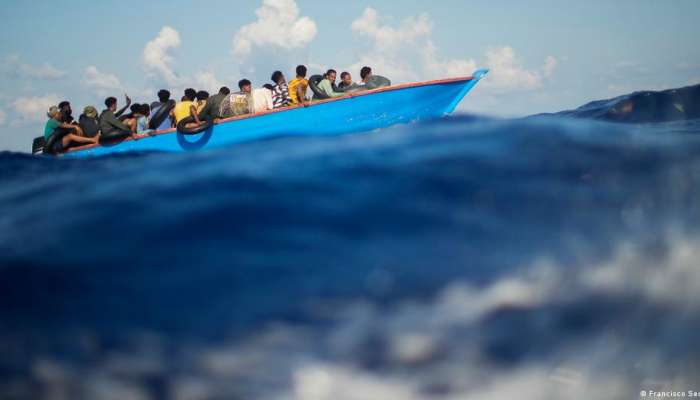

After almost a decade of wrangling, European Union countries have finally agreed to reform the bloc's migration and asylum policy.
The plans, given the green light by ministers on Thursday, should see migrants more fairly distributed across the EU's 27 member states and shake up asylum application practices to allow authorities to deport people more swiftly.
"I didn't really believe I would be sitting here saying this, but here we are," Swedish Migration Minister Maria Malmer Stenergard told reporters after chairing 12 hours of talks.
"It is a historic step and a great success to finally be able to unite so many member states."
The deal, which needed backing from a qualified majority of the bloc's members — representing at least 65% of its population — paves the way for final negotiations with lawmakers at the European Parliament.
But critics say Europe is shutting itself off from asylum seekers and shirking responsibility.
EU countries should take in migrants or pay
Years of thorny debate have centered on one issue: How to distribute irregular migrants — those entering the EU illegally — across member states more fairly.
Most irregular migrants arrive on the EU's southern coast, in countries such as Italy, Spain and Greece, often making dangerous journeys in small boats that depart from Turkey, Tunisia, or Morocco.
EU law states that people must claim asylum in the country where they first arrive, which has left southern states demanding more help.
In the past, Brussels tried to force northern and eastern EU countries to take in a certain number of migrants based on the size of their population. But the attempt failed, and migration policy expert Helena Hahn told DW that such an approach is no longer "politically feasible."
Under the new compromise, EU countries can opt out of relocating migrants if they pay a fee of €20,000 ($21,553) per person into a fund managed by Brussels.
"The idea is that there is a pool of options available to member states in order to showcase solidarity with a country that is experiencing so-called migratory pressure," Hahn explained ahead of Thursday's make-or-break meeting.
But some EU governments are not on board.
"Brussels is abusing its power," Hungarian Prime Minister Victor Orban wrote on Facebook on Friday. "This is unacceptable! They want to turn Hungary into a country of immigrants by force."
Poland also complained, but both countries' objections were overruled in the majority voting system.
Campaigners too have slammed the deal for different reasons, with Oxfam's migration expert Stephanie Pope accusing EU countries of trying to "buy themselves out of their responsibility to welcome refugees."
New border procedures to speed up deportations
EU ministers also agreed on a new system to separate asylum applicants based on how likely they are to be granted protection.
In 2022, only 40% of those who sought refuge in the EU qualified for asylum and authorities want to beef up deportation powers.
Under the plans, people from countries considered safer would have their applications filtered through a fast-track assessment procedure at the border. This would apply to those hailing from states with recognition rates below 20%.
In 2022, that included India, North Macedonia, Moldova, Vietnam, Tunisia, Bosnia and Herzegovina, Serbia and Nepal, according to the EU's asylum agency.
The process would also apply to people deemed to be a national security threat or to have misled authorities, although there would be a cap on how many migrants can be directed through this new procedure.
All of those subject to the updated system, including families, would be barred from entering the country and instead detained in special centers at the border — something rights groups say is unacceptable.
"This is not a fair asylum procedure," Karl Kopp, director of European affairs with Germany's largest pro-immigration advocacy organization, Pro Asyl, told DW.
"We are quite shocked," Kopp said. "It's more of a sell-out concerning human rights and refugee rights."
Oxfam's Stephanie Pope echoed those concerns in a statement, saying the new procedure would "lock away refugees, including children, at huge cost, in prison-like centers at Europe's edges and block their right to asylum."
Those from countries considered less safe would still go through the normal asylum procedure. Last year, nationalities with the highest asylum recognition rates in the EU included Syrians, Belarusians, Eritreans, Yemenis and Malians.
Asylum reform sparks division in Germany
The proposal has also caused divisions in Germany's coalition government after it was criticized by some Green party lawmakers.
In a statement following the decision on Thursday, German Interior Minister Nancy Faeser, from the center-left SPD party, promised to keep advocating for children's rights and push for an exemption for minors.
In a letter to her party seen by German press agency DPA, Germany's Green foreign minister Annalena Baerbock said the decision to back reforms was "very difficult," but ultimately the right decision.
EU Home Affairs Commissioner Ylva Johansson also defended the proposals. "Now we set clear rules and a European standard," she told reporters on Friday.
"This is a clear possibility to have swifter processes and swifter return decisions, which is important for the return rate, but also for the individual not to be left in limbo for a long time."
What happens next?
While Thursday's deal was described as historic by ministers, it is not the end of the story. EU parliamentarians will also have a say, with countries and lawmakers hoping to negotiate and strike a final accord on the reforms in 2024.
EU Home Affairs Commissioner Ylva Johansson remained confident on Friday, telling reporters she did not expect negotiations to be "very tough."
Campaigner Karl Kopp told DW that elected EU lawmakers would play a crucial role. "It's now up to the parliament to stick to the human rights principles and to improve, let's say, this very bad legislation," he said.
President of the European Parliament Roberta Metsola tweeted that lawmakers were "ready to start negotiations immediately."
"We can find a way forward," she wrote.